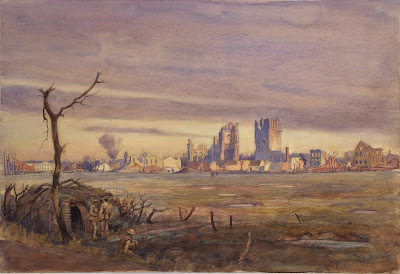 |
| First Glimpse of Ypres, Lt. C.H. Barraud, Canadian War Museum |
As war poet
Richard Aldington wrote, some aspects of the Western Front were “More beautiful than one can tell.” Carola Oman, a Voluntary Aid Detachment (VAD) nurse, wrote poetry that offers a woman’s perspective, describing the beauty she found in the landscape of war.
In the Ypres
Sector
And it is we
that are both deaf and blind.
By coarse grass
mounds here the small crosses rise
Sunk sideways in
the ditch, or low inclined
Over some little
stream where waters sing
By shell holes
blue with beauty from the skies.
Even the railway
cutting has kind shade
And colour,
where the rusty wire is laid
Round the soft
tracks. Because you knew them thus
The dark mouthed
dug-outs hold a light for us.
And here each
name rings rich upon our ears
Which first we
learnt with sorrow and with tears.
--Carola Oman
The first line
opens with the tenderness of a love poem: “You have left beauty here in
everything.” Who does the poem address? The beauty has been left by each soldier who has known the “dark mouthed dug-outs,” and every man buried under the
“small crosses [that] rise/ Sunk sideways in the ditch.” The dead of the Ypres Sector imbue the land with beauty, from the watery
shell holes that reflect the blue of the sky, to the shade and colour of the
barbed wire stretched along the Western Front.
And what are the
names that ring “rich upon our ears”? Messines, Langemarck, Zonnebeke, Zillebeke,
Hill 60, Polygon Wood, and Passchendaele – these are the names of the places
where the sheer volume of death and suffering threatened to overwhelm the
imagination.
How can Oman possibly describe these
places of sorrow and tears as “rich”? The poem reveals that the names have achieved
their reverent power not because of the military objectives that were won or lost there, but because “you knew them thus.”
The battles’ names have been sanctified by the presence of those who
fought and died there: men who were dearly loved – husbands, fathers, brothers,
uncles, and sweethearts.
Over fifty years
earlier, Abraham Lincoln dedicated the American Civil War cemetery at
Gettysburg, saying, “We cannot
dedicate -- we cannot consecrate -- we cannot hallow -- this ground. The
brave men, living and dead, who struggled here, have consecrated it, far above
our poor power to add or detract.” In a similar vein, Carola Oman, in her poem “The Menin
Road, March 1919,” looked out over the “flat dim land,” and asked, “I
wonder are you wholly gone?” A sense of the courage and spirit of the men of the Ypres Sector still lingers at the battle sites, one-hundred years later.
Oman’s small book of poetry, The
Menin Road and Other Poems (1919), is dedicated to four of her friends who were
also V.A.D.s working in the hospitals and casualty clearing stations of the war
as they tended the never-ending parade of dying and wounded men. Her poems are dedicated to Lillian
Chapman, Janet Dundas Allen, Una Barron, and May Wedderburn Cannan, “In memory
of days we served together in England and France.”
This post also attempts to honor the V.A.D.s and nurses of the First World War, who fought their own battles and who warred against suffering and despair to find “beauty in everything.”


I have become more and more interested in reading of the experiences of women during WW1. This was a wonderful post. I would love to see more of Carola Oman's work. I'm wondering of any of the nurses she mentions were also poets.
ReplyDeleteOman is one of my favorite of the overlooked poets, and I'm hoping to share more of her work on the blog in the future. I've previously posted on two of her other poems, "To the Survivors": https://behindtheirlines.blogspot.com/2016/11/to-survivors.html and "Unloading Ambulance Train" https://behindtheirlines.blogspot.com/2017/05/song-of-ambulance-train.html. You can also check any authors that you like to see if I've posted multiple poems by finding the list of tags (authors' names and nationalities) on the right side of the blog and clicking on the tag with an author's last name. May Wedderburn Cannan was also a poet, and dedicated one of her poems to Oman: "France (to C.M.A.O.): https://behindtheirlines.blogspot.com/2017/03/speak-of-france-with-me.html
DeleteThanks for reading and commenting!
Thank you! I'm completely hooked on this blog! It's my absolute favorite.
ReplyDeleteThat's very kind of you!
Delete